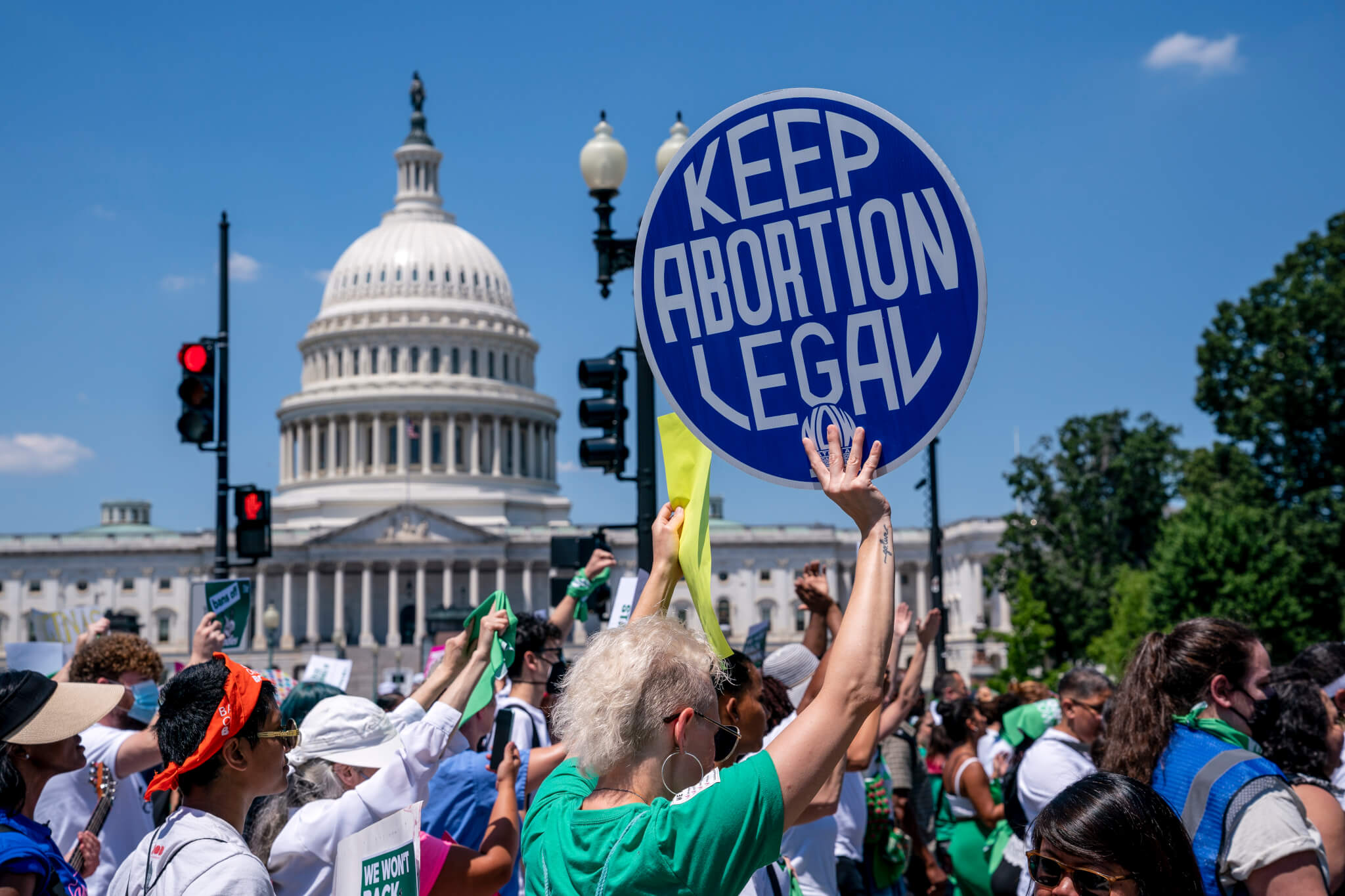
Abortion-rights activists demonstrate against the Supreme Court decision to overturn Roe v. Wade that established a constitutional right to abortion, on Capitol Hill in Washington, Thursday, June 30, 2022. (AP Photo/J. Scott Applewhite)
Now that the landmark abortion case Roe v. Wade has been overturned, what could happen not just in Virginia, but across the country, to reproductive rights and abortion access?
This is the first piece in an ongoing series that will take a look at the potential repercussions on reproductive rights and abortion access due to the fall of Roe v. Wade. Are you an advocate for reproductive rights, abortion access, and women’s health? A medical professional? Someone who has even had an abortion? Please get in touch with Meghin at [email protected] to chat.
For now, abortion access in Virginia is going to remain safe and legal, but that’s not the case in many states across the country. There are 10 states, including neighboring Tennessee, where abortion is totally illegal, including in cases of rape and incest.
In the wake of Roe v. Wade being overturned, there are at least 25 states that will seek to enact legislation to ban abortion, as well as others that will try to restrict abortion access.
Even though abortion is going to remain safe and legal in Virginia, the Democratic majority in the State Senate is slim. “Any bill that comes to my desk I will sign happily and gleefully in order to protect life,” said Republican Governor Glenn Youngkin during an online forum that was organized by the pro-life Family Foundation of Virginia, after Roe v. Wade was overturned.
He’s also in support of a 15-week abortion ban, including exceptions for rape, incest, and to protect a mother’s life. This is in contrast to his controversial budget amendment 30, which did not pass through Virginia’s Senate. Under the failed budget amendment, Medicaid-eligible individuals would not be able to use any state funding for a nonviable pregnancy.
Educational Impacts
Education plays a key role in the fight for abortion access. In many states where abortion is banned, or will be banned, comprehensive sex education isn’t required. How does this tie into the fall of Roe v. Wade? Without comprehensive sex education in schools, students might not learn about various forms of contraceptive, how to prevent unwanted pregnancies and sexually transmitted infections, and the importance of bodily autonomy and understanding of human anatomy.
Quality sex education is lacking in many parts of the country, and sex ed classes can vary from school to school. Children and teenagers will always have questions, and somehow providing no sex education or an abstinence-only program will only lead to more questions.
In an opinion piece published by Boston University (BU), Sophie Godley, a clinical associate professor of community health sciences at BU’s School of Public Health, said that even when sex ed is taught in states that require it, it might not even be medically accurate.
“It doesn’t truly answer children’s questions, and it doesn’t equip young people with the information and the skills and the knowledge that they need. What happens with sexual education in the United States is that your geography is your destiny. Where you’re born, or more importantly, where you go to school, largely determines whether you’re going to receive medically accurate, evidence-based, scientifically proven effective education,” she said.
For a look at what sexual education looks like in Virginia, the Sexuality Information and Education Council of the United States (SIECUS) has a profile on Virginia’s curricula, last updated in May of 2021. In the commonwealth, schools are required to follow Virginia’s Family Life Education Guidelines and Standards of Learning if sex ed is taught. Included in the Standards of Learning? An emphasis on abstinence until marriage. When it comes to abortion, in the ninth grade, students learn that “abortion is not presented as a method of birth control, but spontaneous abortion or miscarriage is explained, and the risks of induced abortion are analyzed.” The Standard of Learning does not specify what “induced abortion” actually means.
It’s also in the Code of Virginia to make sure curriculum guidelines for students in kindergarten through 12th grade include “instruction as appropriate for the age of the student in family living and community relationships; the benefits, challenges, responsibilities, and value of marriage for men, women, children, and communities; the value of family relationships; abstinence education; the value of postponing sexual activity; the benefits of adoption as a positive choice in the event of an unwanted pregnancy; human sexuality; human reproduction; the prevention of human trafficking; dating violence; the characteristics of abusive relationships; steps to take to deter sexual assault, the availability of counseling and legal resources, and, in the event of such sexual assault, the importance of immediate medical attention and advice, as well as the requirements of the law.”
The “What Ifs” and “What Abouts”
There are many “What Ifs” and “What Abouts” that pop up in the aftermath of the fall of Roe v. Wade, especially when it pertains to women’s health, even in Virginia. Staff in medical centers throughout Virginia have already started to have meetings to discuss what to do in the case that abortion becomes illegal in the commonwealth. Questions have already started to pop up about medication access, what to do about ectopic pregnancies and miscarriages, and even how to care for women and children in emergency situations.
Perhaps one of the biggest “What Ifs” is the question of “what if abortion becomes illegal in Virginia?” A lot could happen, including the fact that women seeking care from other states like Tennessee, North Carolina, and other Southern states might have to travel even longer distances for help. For a Southern state, Virginia could be seen as a haven state for those traveling to seek an abortion or reproductive health care. There’s always the chance that interstate travel to get an abortion could be restricted as well, or that providers could refuse to prescribe certain medications to people from out-of-state.
Tying into the above, another “What If” involves health care providers, including emergency room personnel, as well as those who aid people in seeking an abortion. What if lawmakers in Virginia look to create legislation that would put bounties in place, similar to those in place in Texas and Idaho? If abortion access is restricted in Virginia, that puts providers into a tough spot, because then they have to think about things like vital signs, and ask the question of “when is someone sick enough for an abortion?” If abortion becomes illegal in Virginia because of Roe v. Wade’s overturn, it could also lead to more assaults against health care workers in hospitals, doctors offices, clinics, etc.
What about medication-based abortions? Medicines like misoprostol and mifepristone used to help facilitate a medication abortion, are also used in other aspects of gynecological care, like in cases of cancer, or heavy bleeding.
Crisis Pregnancy Centers, Women’s Health Centers, and Abortion Clinics
In the immediate aftermath of the fall of Roe v. Wade, a women’s health clinic in Bristol, Tn. is crowdfunding to move its services across the state line to Bristol, Va. Dr. Wesley F. Adams, Jr. is one of the OB-GYNs at the Bristol Regional Women’s Center and has been practicing medicine for over 40 years. On the GoFundMe page that was originally created after a leaked draft opinion was made public, Dr. Adams said that he and his staff “will do everything” within their power to keep abortion accessible to women not just in the Tri-Cities region in Tennessee, but in Virginia as well.
Whole Woman’s Health, which has two locations in Virginia, has also said that they will be moving across state lines from Texas to New Mexico to help provide care for women who need it.
It’s also important to note that women’s health centers aren’t just doctors and health care providers offering only abortion services; they provide services like hormone replacement therapy, cervical and breast cancer screenings, and they have providers who help patients who are experiencing issues with their menstrual cycles. Providers at women’s health clinics also offer education on sexual health and contraceptives, and help women through their pregnancies. Providers at these clinics and centers are well-skilled and educated, and have undergone years of training to be able to provide quality care for patients.
Because Roe v. Wade has been overturned, there’s a very real possibility that more crisis pregnancy centers (CPCs) could pop up. CPCs have been known to deceive people, because many women don’t realize what the centers actually are, until it’s too late. CPCs market themselves as medical centers, but don’t always have licensed medical professionals on staff. They also tend to pop up in places near legitimate women’s health centers or abortion clinics, or areas where women are very vulnerable, like in college towns. By doing so, CPCs are set up to mislead individuals seeking out reproductive health services, or pregnancy services. CPCs are linked to many religious pro-life organizations, and have been known to spread misinformation about women’s health, abortion, and even sexual education. They also don’t provide pre- or post-natal care for pregnant women, which is something that women’s health clinics can and do provide patients, even if they aren’t insured.
The future of reproductive health care and abortion access is more important now more than ever, because Roe v. Wade has been overturned. It opens up more questions than answers about how to keep abortion access and reproductive health care safe and legal.
Politics

Biden administration bans noncompete clauses for workers
The Federal Trade Commission (FTC) voted on Tuesday to ban noncompete agreements—those pesky clauses that employers often force their workers to...

Democratic shakeup in Virginia primaries for governor, lieutenant governor
Richmond Mayor Levar Stoney quit his bid for governor and jumped into the race to be the Democratic nominee for lieutenant governor. The race for...
Local News

Virginia verses: Celebrating 5 poetic icons for National Poetry Month
There’s no shortage of great writers when it comes to our commonwealth. From the haunting verses of Edgar Allan Poe, who found solace in Richmond's...

Join the fun: Recapping Family Literacy Night’s storybook adventures
When’s the last time you read a book aloud with a loved one? If it’s difficult to answer that question, then maybe it’s time to dust off that TBR...





